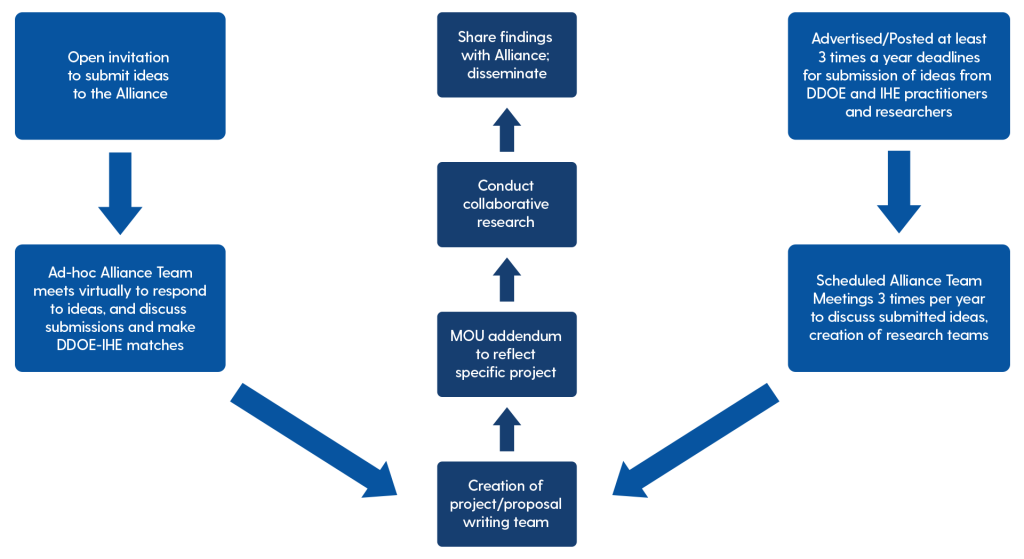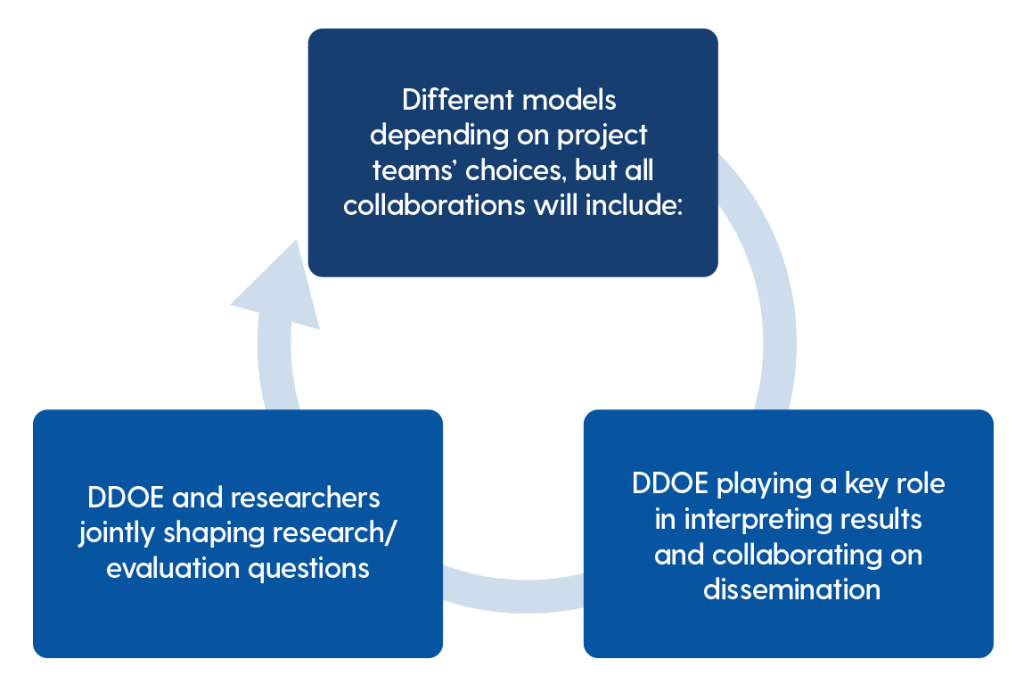The Delaware Education Research Alliance (DERA) is designed to facilitate collaborative research that uses teacher, student and school administrative data to answer important questions with implications for improving preK-16 education across the state and beyond.
DERA is a collaboration between the Delaware Department of Education (DDOE), Delaware State University (DSU) and the University of Delaware’s College of Education and Human Development (CEHD).
The overarching goals of the alliance are to support and enhance and catalyze collaborative research to address pressing education issues in the state. Our goal is to create a system where collaboration is systematic and ongoing, including developing dynamic procedures for joint inquiry.
Request for Researchers interested in studying life skills program in Delaware correctional institutions
How could Delaware’s Life Skills program be more successful? Is the recidivism rate lower for participants than non-participants? Would an extension of the Life Skills program into the community improve quality of life outcomes for participants? Would the continuity of care increase rates of steady employment and positive interactions with the community for participants and their families?
If you are interested in potentially partnering with Cindy DelGiorno, Life Skills Program, Baylor Women’s Correctional Institution, to design and implement a study of the Department of Education’s Life Skills Program, please contact Adrian Peoples, adrian.peoples@doe.k12.de.us.
Delaware Education Research Alliance (DERA) Request for Proposals (RFP)
The Delaware Education Research Alliance is pleased to support the Spencer Foundation Conference, “The intersection of racial equity and time-series methods.” DERA accepts proposals at any time, but we encourage submissions in response to DERA scheduled RFPs.
DERA will facilitate educational research by creating a mechanism for ongoing, meaningful collaboration between partners. Faculty researchers with projects related to preK-16 education may propose their projects to DERA. DERA will support these projects by helping to match DDOE staff with researchers, and by facilitating data-sharing across partner organizations. By supporting these research projects, DERA aims to inform evidence-based decision-making for Delaware students, teachers, and leaders, while simultaneously contributing to the larger body of knowledge guiding education policy.
DERA will pose calls for requests for proposals (RFP) at least three times throughout the year, which will ask for a very brief summary of the research questions, data, design and implications. The submission forms for these RFPs will be posted on this page. An Alliance Team will meet three times throughout the year to discuss the submissions and create research teams.
DERA will also have the flexibility to respond to ad hoc opportunities as they occur throughout the year. Any faculty/staff in one of the member institutions may contact that institutions’ DERA lead at any time with an opportunity. An ad-hoc Alliance team will meet periodically to respond to ideas, submissions, and make matches.
CEHD and DSU researchers and DDOE staff may propose a project by submitting it to the DERA working group through this proposal form. The working group will then seek to match researchers with DDOE staff.
The DERA working group will identify appropriate DDOE staff leadership on a project-by-project basis. Similarly, DERA will help facilitate the identification of DERA researchers appropriate for each project. The Alliance team will help to establish a MOU to reflect the requirements of the specific project, after which the researchers engage in DERA collaborative research process.

The model for designing and executing the research plan will vary by project, jointly decided by the DERA researchers leading each project. For some projects, DDOE staff may choose to be deeply involved in the research design, and the ongoing research activities and analysis. In other cases, DDOE staff may decide to limit their involvement to jointly developing the key research questions and collaborating on interpretation and dissemination. The DDOE and university PIs for each project will establish a collaboration with interaction at a depth and cadence that suits them.
While DERA work may occur anywhere on this continuum from deep to more strategic involvement, the hallmark of this work will be two main pillars:
- DDOE and university researchers will jointly shape the research/evaluation questions to ensure that the questions respond to DDOE needs, properly consider contextual realities, and appropriately suit data and design.
- DDOE will collaborate to interpret results in the context of state and district factors and collaborate on a dissemination or reporting plan for policymakers and practitioners.

DERA is able to track individual students and link them to enrollment, attendance, demographics, discipline, coursework, assessments, and teachers for 2014-15 through 2022-23 school years, grades K-12, except for assessment (3-8 & 11 for SBAC, 1-10 for ACCESS, 9-12 for SAT, and 2, 4-9, and 11 for DeSSA) and coursework (grades 3-5). Please note that the assessment data for school year 2019-20 is incomplete due to COVID-19 pandemic. In addition, DERA has access to some qualitative data, such as Early Learner Survey, School Climate Survey, Educator Mobility Survey, specialized datasets around Career and Technical Education, as well as access to National Student Clearinghouse data.
Any additional data that is not already part of a DERA data repository can be additionally requested as part of the individual research project statement of work.
The DDOE is a steward of Local Education Agency (LEA) data. University researchers need access to data to conduct analyses. One goal of DERA is to simplify and make more efficient the sharing of data with university researchers to conduct projects under the Alliance.
Financial Support
DERA projects may or may not have external funding; having a grant is not required to propose a project under DERA. It should be noted that DERA is not meant to operate as a filter for all university research projects. DDOE staff and DSU/UD researchers have a history of working together, and DERA is not meant to interfere with those relationships.
Rather, the goal is to leverage and catalyze more such work, and to provide a systematic process for projects to develop under this alliance.
DERA is not designed to support student dissertations, but we hope that graduate students will work closely with researchers on their DERA projects.
Contact Us
The CEHD Dean, Delaware State University Provost and Chief Academic Officer and the Delaware Secretary of Education provide critical leadership and support for the Alliance. The Alliance working group is led by the CEHD Research Director, the DSU education chair and the DDOE Lead Education Associate for Data Management and Analysis.
Inquiries from UD, please contact Dr. Kenneth Shores, kshores@udel.edu ; from DDOE, please contact Adrian Peoples at adrian.peoples@doe.k12.de.us, from DSU, contact Shelley Rouser at srouser@desu.edu.



